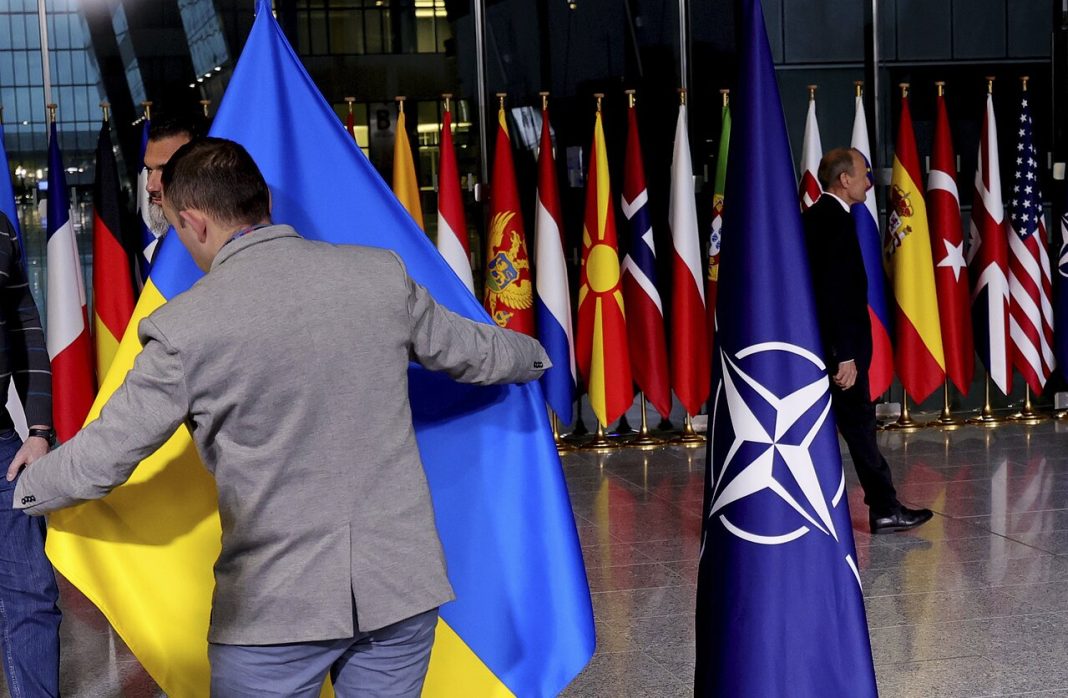The Pew survey puts hard numbers behind divides playing out on Capitol Hill over support for Ukraine and attacks by former President Donald Trump, the presumptive Republican presidential nominee, criticizing NATO countries as failing to share the burden of the security alliance.
“We saw in the last election, something that will be on the mind of both voters, as well as the candidates and then part of the debate ahead of the elections, is the U.S. role in the world, whether that’s on its own, or as a NATO member,” said Moira Fagan, research associate with Pew.
“And so these numbers really speak to that moment.”
While the Pew survey found that most Americans support NATO (58 percent), that number has dropped by 4 percentage points since 2023, marking a statistically significant decline, the authors wrote.
The partisan divides are sharper: Three-quarters of Democrats rated the organization favorably, compared to only 43 percent of Republicans. That number is down from 55 percent in March 2022, one month after Russia launched its full-scale invasion of Ukraine.
“These numbers have flipped,” Fagan explained, pointing to changing support among Republicans toward Ukraine.
“When the war broke out in the spring of 2022, we saw about half of Republicans saying the U.S. was not providing enough support to Ukraine, versus too much, only 9 percent said that at the time.”
Now, about half of Republicans say the U.S. is providing too much support to Ukraine, while 13 percent say not enough is being provided, Fagan continued.
“Democrats have remained largely stable in saying a mix that support is not enough, or about right.”
The numbers speak to deep divisions among Republicans in Congress, with the majority of House GOP members voting against a $61 billion security assistance package related to Ukraine in April that was delayed for months amid Republican opposition. The bill passed with support from Democrats.
The Pew poll took place April 1-7, shortly before the House passed assistance for Ukraine. It surveyed 3,600 U.S. adults who are members of the center’s American Trends Panel, and respondents are recruited through national, random sampling of residential addresses.
Pew added the survey is weighted to be representative of the U.S. adult population by gender, race, ethnicity, partisan affiliation, education and other categories.
The survey also tested Americans’ knowledge of NATO, with a little more than half (56 percent) correctly identifying Europe and North America as the two regions from which the alliance draws membership. Although, Americans were confused over Ukraine’s relationship to the alliance, with 41 percent correctly identifying it as a nonmember.
“Those who have more knowledge of NATO are more inclined to see the organization favorably,” the report’s authors wrote.
Fagan said the numbers demonstrate that there’s no partisan divide on knowledge of NATO, showing that Americans are generally well-informed about the substance of current affairs and hot-button debate issues.
In July, President Joe Biden is set to host the annual NATO summit in Washington, marking the alliance’s 75th anniversary. NATO allies view the summit as a critical opportunity to express the alliance’s solidarity in support for Ukraine, even as members are divided over Kyiv’s future in the alliance.
And while most Democrats and Republicans in Congress support U.S. participation in NATO, the alliance is a fixation for former President Trump, who has threatened to withdraw America from the alliance, held back from committing to the mutual-defense pact of the treaty, and criticized member states who have not yet increased their defense spending to the alliance’s goal of 2 percent of gross domestic product.
Trump’s potential for victory in the 2024 presidential election prompted lawmakers to pass legislation in December seeking to bar any president from withdrawing from NATO, although skeptics view the law’s provisions as weak.
Trump’s antagonism toward NATO feeds into a general isolationism of his “Make America Great Again” movement, which critics fear will withdraw the U.S. from its position as a global leader and embolden Russian President Vladimir Putin. Trump has boasted about negotiating with Putin an end to his war in Ukraine, raising fears among Kyiv and its supporters that any deal would undermine Ukraine’s sovereignty and security.
The Pew survey found that Americans overwhelmingly hold negative views of Putin, with 88 percent saying they do not have confidence in the Russian president to do the right thing regarding world affairs.
But there are partisan divides on American favorability toward Ukrainian President Volodymyr Zelensky. In the beginning of Russia’s full-scale invasion, the Ukrainian president was held up as a courageous, wartime leader leading a hard-scrabble defense against Russia.
But after two years of war, Americans’ favorability — especially among Republicans — is waning.
While 48 percent of Americans said they have some or a lot of confidence in Zelensky to do the right thing regarding world affairs, that number represents an 8 point decrease since 2023. And only 34 percent of Republicans supported Zelensky, compared to 65 percent of Democrats.
“Since the war has broken out, we’ve seen that negative views of Russia, a lack of confidence in Putin, has really been quite stable,” Fagan added.
“But we do kind of see … views of NATO have dropped slightly over the past few years. In general, the public is less likely to be supportive of Ukraine aid … There’s a partisan divide: Democrats are more likely to say that helping Ukraine helps U.S. national security, Republicans say that hurts national security.”
“Some of this movement that we see is driven just by the declining support for NATO and Ukraine among Republicans, typically, while the Democratic numbers have remained a little bit more stable,” she continued.
